One year on from the UK’s racist riots: calling for answers and systemic change
One year after the racist and Islamophobic riots, the safety and rights of racialised and marginalised communities in accessing maternity care remain unaddressed. We’re calling for systemic change, not silence.

During the racist and Islamophobic riots last year, Birthrights had serious concerns about how the unrest may have affected access to safe and equitable maternity care, particularly for Black, Brown, Muslim, refugee, and asylum-seeking women and birthing people. Based on our communications with individuals and community groups at the time, we understand that some people may not have felt safe travelling to hospitals or birth centres during this time, and in certain areas, community clinics and services, including time-sensitive postnatal care, were temporarily closed. Where no alternative provision was put in place, this may have contributed to delays or missed care and added to the fear and uncertainty experienced by affected families.
Reflecting on impact and the government’s response
These events exposed how emergency planning and crisis response systems failed to consider the needs of marginalised communities or protect minoritised staff expected to continue working under threat. The long-term impact of this can be observed in the deepened mistrust in the healthcare system, and an increase in people feeling their only option is unassisted birth, not out of choice, but fear. What happened last year highlighted systemic neglect and a lack of preparedness that continues to put lives at risk.
Since then, authorities have remained silent on how they plan to address these issues or ensure that maternity services are protected during future emergencies. Meanwhile, we are faced with an increasingly challenging political climate where the racist rhetoric and actions targeting asylum seekers, migrants, and refugees have escalated. Asylum-seeking women already face significant barriers to accessing safe and respectful maternity care. Many have limited understanding of the system, are offered fewer choices, and receive less support than others. Unstable housing, lack of interpretation services, fear of NHS charging, and inadequate hygiene conditions all compound these challenges.
We are deeply concerned about how fear, racism, and violence continue to undermine access to safe and respectful care.
One year on, we’re calling for answers:
- What action has been taken to ensure NHS Trusts are working with hospitals and community services to keep maternity care safe during times of crisis?
- We are writing to local, regional, and national decision-makers demanding accountability and answers on what’s been done so far.
- We urge you to do the same and use our template letter to raise your voice. Join us in our fight for S.A.F.E Maternity Care for ALL women and birthing people across the UK by supporting our calls to the government for new legislation.
Have you been impacted by the racist riots?
If you have been impacted – whether as a pregnant woman or birthing person or a professional working in maternity care – we want to hear from you. By sharing your story with us via email at: [email protected], you can help to inform our campaigns and advocacy work. Anything you share with us will be confidential and will not be shared without your consent.
Resources
- We’ve developed a letter template for individuals and a letter template for community groups and grassroots organisations to take action. Download the template applicable to you below and use it to email the relevant authorities to demand updates and concrete action in response to the racist riots.
- Use this free tool to easily find the politicians who represent you (national or local) and write to them using the template.
- Don’t forget to CC us in at [email protected] or tag us on social media when you’re done! Learn more and support our calls for a S.A.F.E Maternity Care Act here, and read more about how we channelled our energies in response to the racist riots last year here.
- Make sure to subscribe to our newsletter to stay updated on our campaigns and advocacy work, and please consider supporting Birthrights in other ways. By supporting us, you are helping to ensure that everyone receives respectful maternity care that protects their fundamental rights.
We have been taking action.
Birthrights has written to the Department of Health and Social Care, the England Chief Midwifery Officer, the NHS Maternity Programme, the Northern Ireland Chief Midwifery Officer, and all metropolitan mayors to hold them accountable and ask about their actions to address gaps exposed over the past year and to urge NHS Trusts to embed fundamental human rights into emergency protocols.
Read our full letter to Wes Streeting, Secretary of State for Health and Social CareWe highlighted the experiences shared by our community partners, who describe the impact of targeted violence and systemic racism as deeply personal. Staff and service users from minoritised communities face discrimination, isolation, and fear within the very systems meant to provide care. They warn that unchecked racism can permeate institutional culture and harm those already most vulnerable during pregnancy and birth.
We raised concerns about the ongoing dismantling of community-based maternity services, including the closure of birth centres, disbanding of home birth teams, and overstretched midwives. These issues disproportionately affect Black and Brown women, disabled people, migrants, and asylum seekers, many of whom already mistrust the healthcare system. Fear and systemic barriers, including harmful NHS charging rules, are driving some to consider unassisted births, a lawful choice, but one that should never result from fear or lack of alternatives.
- The systematic dismantling of community maternity services, with home birth teams disbanded, birth centres closed, and midwives overstretched, which continues under the guise of “safety and efficiency.” This is particularly concerning for Black and Brown women and birthing people, disabled people, migrants, and others who already mistrust the healthcare system due to a hostile political climate and a lack of accessible, culturally safe options
- The fear and threat felt by minoritised communities, including refugees and asylum seekers, which deters them from accessing hospital or community-based care.
- The long-term effects of the hostile environment on migrants’ and asylum seekers’ ability to access care, including harmful NHS charging rules that deter people from accessing care and force healthcare professionals to act as pseudo-border control officials
- A growing mistrust in the healthcare system, which is pushing some to consider unassisted births. This is a lawful option, but one that should be a genuine choice, not one made out of fear or lack of alternatives.
Trusts must take urgent steps to reach out to women and birthing people, communicate clearly, and ensure everyone can access care anywhere (at home, in hospital, or in midwifery-led units and birth centres) without fear, discrimination, or harm.
The starting point, even in crisis, must always be to uphold the human rights of women and birthing people. This includes our right to decide where we give birth, how we give birth, and who is with us when we give birth, our rights to make informed decisions about our bodies and our care, our rights to be treated with dignity and respect, and fundamentally our right to life. These should be built into resilience and emergency planning protocols.
